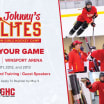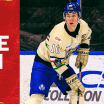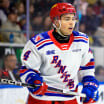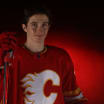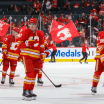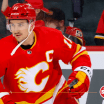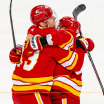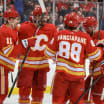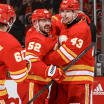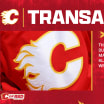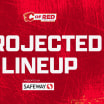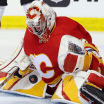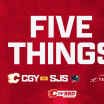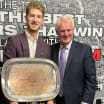Born in Calgary, drafted by the Flames (when still based in Atlanta), the franchise's all-time leader in penalty minutes and one of the toughest players ever, Tim Hunter is now head coach of the WHL Moose Jaw Warriors.
He's also part of Dominique Ducharme's Canadian staff for the upcoming World Junior Hockey Championships, being held in Montreal and Toronto, Boxing Day through Jan. 5th.
One of the game's truly good guys, Hunter took time out from his hectic schedule for a chat about the upcoming World Juniors, fighting's place in hockey, the Battle of Alberta at its visceral apex and May 25th, 1989.
Tim Hunter - Q&A
Tim Hunter on the upcoming World Junior Championship and The Battle of Alberta
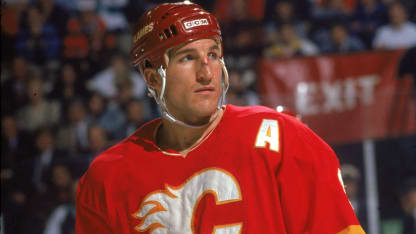
© B Bennett/Getty Images
By
George Johnson @GeorgejohnsonCH / CalgaryFlames.com
CALGARYFLAMES.COM: The World Juniors are part of Canada's Christmastime culture now. Like rum-spiked eggnog or watching It's A Wonderful Life for the 10,000th time. Talk about the opportunity to coach in your first WJC tournament.
HUNTER: As a junior player, I never had the opportunity or aspiration. It just wasn't a big thing for me. As a player in the NHL, playing in any, way, shape or form for Hockey Canada wasn't going to be a reality.
But when I became a junior coach, coaching at some level for Canada became a goal of mine. The start was the U-18 World Championships and it was as great as I'd imagined.
Just to be part of the program, under that Hockey Canada umbrella and wear the logo is very special. That started it.
Getting to this next level has been another thrill. I'd love to be head coach of the World Junior team sometime, if possible.
Right now, I'm looking forward to coaching four No. 1 lines, three pairs of No. 1 defence and a couple No. 1 goalies. It's not an all-star team by any means. All players can fit into a team but all these guys are all special in their own way.
That's the fun part of coaching a group like this, bringing so many guys together from different places and trying to create a special group.
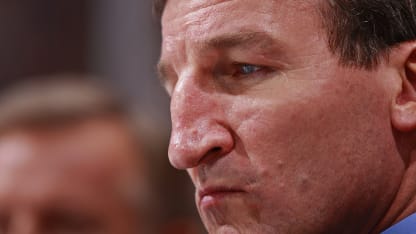
© Jeff Vinnick/Getty Images
CALGARYFLAMES.COM: Being Canadian, and given that the tournament is being held here at home, expectations are through the roof.
HUNTER:Only going for gold - gold or nothing - is the wrong approach. It puts too much pressure on everyone.
I remember my first year (as an assistant) in San Jose, (GM) Doug Wilson talked about winning the Stanley Cup. And we're like: 'No, no, nooooo, you don't talk about winning the Stanley Cup. You talk about having the chance to win the Stanley Cup.' And that's the difference.
Putting yourself in a position to win, that's what Hockey Canada talks about; what our group talks about.
Not just the gold medal game, but every night.
Being a dynasty in any sport is being right there, at the top, every year. If you're winning medals, gold silver or bronze, every year, you're a dynasty, a top team, a top country.
Yeah, we want to win gold but we're going to concentrate on the process. That's the method you have to adopt.
CALGARYFLAMES.COM: Switching gears to your playing career. You started pro in the CHL and legendary tough guy John Brophy - one of the game's enduring characters - was your first coach.
HUNTER:I was drafted as a defenceman but Calgary wanted me to play a bit of forward. I was still trying to find my way to what kind of pro player I was going to be.
One day during practice Broph skates over to me and says: 'Really, the way I see it, for you to make the NHL you have two choices. You can be the best defenceman down here in the Central Hockey League. Or you can be the meanest --- down here in the Central Hockey League.' Then he paused. 'I really think the latter is your best option.'
So I said to him: 'Can we please try for both?'
I really liked Broph. Old school? Oh, yes. The oldest. But he meant the right things in the way he coached. He was trying to make you better as a player and as a person. Some of his methods were … neanderthal. If you looked past all the red faces, the stick-smashing, though, he cared. Once you become a coach yourself you often hear the saying: 'It's always hard when you care more than the players.' But you do feel that way a lot of times. I know Broph did. He cared so much.
He was the best thing for my career, for realizing what kind of player I had to be to get to the next level. So that conversation remains with me to this day.
And, hey, it's not a bad thing to be the meanest --- in the Central Hockey League. By that, he didn't mean I had to fight every night. He wanted me to play hard, be intimidating, stick up for our guys and have a presence. In sport, intimidation is there. And it can take on many different shapes. Toughness isn't dropping the gloves. It's everything from blocking shots to winning faceoffs.
I had another association with Broph when he was in Norfolk, the minor-league team for Washington when I was an assistant with the Capitals. So I saw him at training camps. We had some laughs and I think he was really proud that I'd chosen to become a coach.
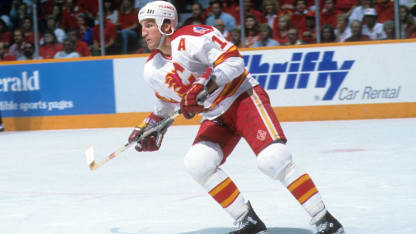
© B Bennett/Getty Images
CALGARYFLAMES.COM: When you watch some of the old Battle of Alberta footage on YouTube, do you find yourself flinching?
HUNTER:They talk about tapping/slashing. Which actually is pretty vicious. You can hurt a guy bad, especially now with the gloves they wear. They're like driving gloves, for crying out loud. So light and supple. You should be driving your Buick with them.
I actually perfected the one-handed slash, where you swing your stick and at the last second release the bottom hand and hit the guy with one hand. They never, ever called it. But the weight of the stick travelling 15 feet across your body and then club somebody on the hands … it was awful. You could see guys just withering in pain.
The things we did … trying to hurt guys. But that was our attitude. We hated Edmonton and they hated us.
CALGARYFLAMES.COM: You and Dave Semenko are forever joined in the public consciousness, like Ali and Frazier or Hearns and Hagler.
HUNTER: Part of it was Calgary was looking for someone to stand up and not be intimidated by his tactics. I got a taste of that my first game. We were playing at the Corral. I did pretty well. The fight was over and the linesman had a hold of me and I thought he had hold of (Semenko's) arms, too. And I'm looking up like: 'Well, there you go, pal. You're not so tough.' And he sucker-punched me over the linesman. Got an arm out and drilled me right in the head and down I went. Then Jim Peplinski jumped in.
But I knew right then there was no such thing as a fair fight with this guy and I'd better be on alert.
That's how he did it. I understood that's how business was conducted.
CALGARYFLAMES.COM: Toughest hombre(s) you ever fought?
HUNTER:Nick Fotiu and Bob Probert. Both such big, strong guys. Nick was the hardest, I think. So difficult to handle. I fought him the one time in New York and if he'd hit me in the face with a punch, instead of the top of my head, he'd have done real damage.
He hit the top of my helmet and it just exploded off the top of my head. I'm just thankful I had the presence of mind to duck.
I stood beside him when he punched Craig Coxe in the orbital bone and broke the bone. I was three feet away, heard the smack and saw the dent in the side of Craig Coxe's face.
Nick was a tough, tough guy.
CALGARYFLAMES.COM: So much controversy over the validity of fighting in the NHL right now. Your take?
HUNTER: I do think it still has a place, in today's game.
I don't have the answer going forward. I think the game we see now still needs it. But the game we see now is not the game we saw 15 years ago, or even 10 or five years ago. And it won't be the same 5, 10 or 15 years from now.
I'm not going to pretend to know what the answers are. I haven't put that kind of thought into it. I do know I've never been a fan of these stage-fighting episodes. We have a player for us the other night who had a fight first shift of the game, for no reason. I told him: 'I had a lot of fights in the NHL and the only reason I ever fought was because the guy was either p--ing me off or p--ing one of my teammates off, intimidating him.' You need a reason. You don't just go out and fight to fight because that's who you think you are.
CALGARYFLAMES.COM: Drift back to May 25th, 1989, the Montreal Forum. The ultimate moment for an athlete, the Stanley Cup-clinching game, but neither you nor Jim Peplinski were in uniform that night. Had to be difficult.
HUNTER:The one thing that will always stay with me is how good it felt to hold that Cup, the three of us: Lanny (McDonald), Jim (Peplinski) and myself. It's one of those things - I may not watch every playoff game but I make sure I always watch the games where the Stanley Cup can be presented. Because it's such a special thing.
I got to two other finals, in '86 and then with Vancouver in '94. So I know what it's like to be disappointed, too.
But in '89, holding that Cup was all that mattered to me. No, I didn't dress for Game 6. But I knew I'd played 21 of the 23 games, was a co-captain, been a big part of the leadership group. It really didn't matter not playing the game. You're not happy at the moment. Who would be? And people say now it would've looked better if (he and Peplinski) had our gear on, at least our jerseys. Naw. It was real. I didn't play. That was the reality of it. But I was part of that team, a big part of that Stanley Cup run and it was special.
No one can take that away from me.
I told Pep: 'We may not be able to skate it around the ice but I'm gonna be the guy that carries it off the ice.' And I did.
CALGARYFLAMES.COM: You coached in Toronto as an assistant when Brian Burke, who's now the Flames' President of Hockey Operations, was there. Thoughts on both.
HUNTER: Toronto is an interesting place. The epicentre of hockey, right? I grew up watching those Leafs' teams in the '60s. We'd pull out the kitchen table and watch the games. I remember the '67 team that won.
I just wish we'd had more success when I was there. I can only imagine how great it'll be when they do finally win again.
I remember that first year being there, I was riding the exercise bike, and Burkie pulling on his new Leafs garb, track suit, T-shirt. And I said: 'Pulling on that logo … special, isn't it?' And he said: 'Yeah, it is really something.'
Burkie's known as this rough and tumble guy. We were there when his son died, when all that happened. For weeks afterwards, you'd be riding on a plane and he'd be sitting there, by himself, with tears in his eyes, thinking about his son.
There's this truculent attitude he adopts. But he's a real good human being, down deep, underneath.
CALGARYFLAMES.COM: Seeing McDavid and Matthews and the rest of the phenomenal young players, wouldn't you agree that the game's in a solid place right now.
HUNTER:That's the fun of the World Junior team, being able to coach the next wave of NHL stars. I coached Brayden Point here (in Moose Jaw). I didn't think he'd go make the Lightning so fast but he's such a great hockey player. Those kids, they don't leave teams any choice anymore.
Whatever nation you want to mention, everybody's starting to produce better players. There's more skill and puck possession than ever. I don't think I've uttered the phrase 'Dump the puck in!' once here in Moose Jaw.
There are 25, 30 players in the NHL right now under 21, 22 years old who are worth the price of admission on their own. That's fantastic for the game.
CALGARYFLAMES.COM: With the World Juniors fast approaching, do you ever find yourself daydreaming about standing on the blueline at the Bell Centre on Jan. 5th at the end of the gold-medal game hearing O' Canada being played?
HUNTER: Maybe a little, way in the back of your mind. But, honestly, I never envisioned winning Stanley Cup until it actually happened. It was about the everyday business of doing the job - for the guys around you, the organization, for yourself.
I know you hear this a lot but it really is the process, whatever level you're at. Making sure you do everything possible to put yourself in the best position to succeed. You can't get ahead of yourself.
That's what I talk to my team about. I know what good hockey looks like. I know what good hockey players look like. I know the way we want to play. And that's what you push for.
You check the boxes off as you go along.
Great practice today? Check.
Team feels good? Check.
Good first period? Check.
Speciality teams good? Check.
Keep checking those boxes, you look up at the end of the night and you're a goal or two up and you know you're going to win the game.
So if we do that, check off enough of those boxes on enough nights, and yeah, there's a good chance we'll be standing at the blueline, hearing the national anthem.
It'd be an amazing moment.



